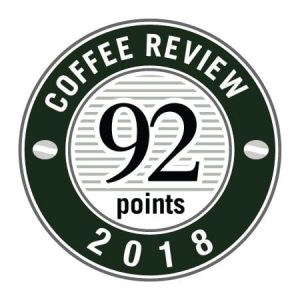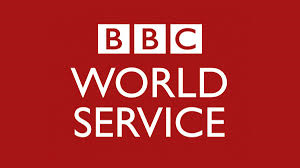By Olivia DeSmit, Conservation International on 12 September 2018

Gorilla Conservation Coffee with a view of the Bwindi Impenetrable Forest. (Courtesy of Gorilla Conservation Coffee)
Editor’s note: September 29 marks National Coffee Day in the U.S. Throughout the month of September, Human Nature is highlighting Conservation International’s sustainable coffee work. This post is the second post in the series.
There are only 1,000 mountain gorillas in existence. About half of them call the lush setting of the Bwindi Impenetrable Forest National Park in southwestern Uganda home, relatively protected from poachers and encroaching development.
For the past two decades, the gorillas — and the communities that live in the shadow of the park, relying on it for food and livelihoods — have had an unlikely ally: coffee. Human Nature spoke with Dr. Gladys Kalema-Zikusoka, a founding member of Gorilla Conservation Coffee, a program that is working to save gorillas “one sip at a time.”
Question: What is Gorilla Conservation Coffee, and how did it come about?
Answer: Gorilla Conservation Coffee is a social enterprise of the non-profit Conservation Through Public Health. Simply put, it pays a premium price for coffee to help the farmers living around Bwindi Impenetrable National Park, where one of the world’s largest remaining populations of mountain gorillas remains.
But to truly understand the project, we need to go back to 1996.
One of my very first jobs was setting up the veterinary department of the Uganda Wildlife Authority, and shortly after entering the job, I had to deal with the very first scabies skin disease outbreak in the mountain gorillas. We learned that scabies was prevalent in the local communities around the park, and ultimately figured out that in order to protect the gorillas, we first needed to improve the health of the communities that interact with the gorillas. The more work we did in the area, the more we recognized how closely linked poverty, human health and conservation were. We wouldn’t be able to protect the gorillas without the support and involvement of the communities, and by protecting the gorillas and their habitat, we could also help locals thrive.
For many people, gorilla tourism would seem like the obvious solution. And while tourism provides sustainable financing for conservation, not everybody can benefit from tourism. Not everyone can be employed by the park or be a porter or work in a lodge. A large number of people end up not benefitting from tourism, so we needed alternative ways to get more sustainable funding for the park while supporting the communities.
In fact, the answer was right in front of us: The park is ideal coffee-growing land, and even as you are tracking gorillas, you are walking through coffee farms. Coffee has a long and rich history in Uganda, and Bwindi park was no exception.

Dr. Gladys Kalema-Zikusoka with members of the Bwindi Coffee Growers Cooperative (© Jo-Anne MacArthur)
Q: So coffee was already being grown in the area, but the communities were still struggling with extreme poverty and health issues?
A: When we met with the coffee farmers in 2015, they told us their biggest problem was not having a steady market or steady prices for their coffee. People had abandoned their efforts to grow Arabica (a higher quality bean that traditionally commands higher prices) because they were being paid the same amount of money as for Robusta beans, despite Arabica costing significantly more to grow. Apparently coffee traders were paying as little as possible, regardless of the bean type.
Some of the farmers were also poachers, going into the park to hunt for meat because when they wanted meat, they couldn’t afford to buy it. Some people in the community also collected firewood from the park, contributing to deforestation of the gorilla’s habitat, so we figured out that if we could keep people sustained by coffee farming, then they wouldn’t have to go into the park for other activities.
So our first step was to find these farmers a steady price and a steady market.
GIVE BACK TO NATURE
Donate to support sustainable coffee.
Q: How does Gorilla Conservation Coffee help the coffee farmers?
A: We have a coffee expert recommended by the Uganda Coffee Development Authority who is almost as passionate about coffee as I am about gorillas. He has helped us set the high quality standards for the coffee — really, he convinced us that we shouldn’t buy bad coffee from farmers, we should only buy good coffee. For the farmers, that translated into a specific set of guidelines for growing coffee, from picking the coffee cherries at the right time to choosing when to pulp them — all things that contribute to a superior product. This is helping them improve their coffee quality because they know they have to be consistent if they want us to buy their coffee, and to get a good price for their coffee. It’s also a ripple effect: They’re using sustainable agriculture and getting better yields, so our hope is others will see that and copy them.
As part of this work, we helped the farmers create the Bwindi Coffee Growers Cooperative. They didn’t have a cooperative to bring them together, which was also contributing to them not getting a fair price, because if you are in a group you can negotiate better. Currently the coffee cooperative has 85 farmers and the chairman of the cooperative sits on the board of Gorilla Conservation Coffee. There is a strong tie to conservation and sustainability because the chairman of the coffee cooperative works within the conservation sector, and the messaging to farmers — don’t go into the park to poach, for example — is clear. Plus, we are buying their coffee, so they don’t really have to go into the park to poach.

Lead Arabica coffee farmer for Gorilla Conservation Coffee in Bwindi, Uganda. (© Jo-Anne MacArthur)
Q: How has the community reacted to Gorilla Conservation Coffee?
A: The community is very excited, and they really feel like we are helping them. One of our biggest buyers is actually two tourism lodges in Bwindi, and they buy more coffee than the private lodges. They even use it in daily consumption and they market it because it’s from their farmers. I think people can clearly see the linkages between gorillas and coffee, and how coffee can be a way to conserve gorillas, not just within the park but within the country at large.
We’ve even started taking tourists on coffee safaris when they come to track gorillas. We team up with coffee farmers who are coexisting with these gorillas, and the tourists really enjoy it because it’s very authentic. The farmer shows them the coffee he has on his farm, the different things he is trying to do. They get to taste the coffee, they get involved in picking it, they get to pulp the coffee. As they drink it, they are getting a presentation about how the work that we are doing is linking the gorilla conservation and the coffee. And they come away feeling really good. Meanwhile, the farmers are getting to meet tourists, which they weren’t before. So, they are getting more into conservation and realizing the importance of conservation to tourism and their livelihoods.
Q: Gorilla Conservation Coffee recently joined the Sustainable Coffee Challenge, an initiative launched by Conservation International and partners to make coffee the world’s first completely sustainable agricultural product. Why?
A: We joined the Challenge in July of this year, as did the Uganda Coffee Development Authority — signaling that the government agency in charge of coffee in Uganda is on board. The Challenge is a network of all the different actors in the coffee supply chain, from growers to traders to merchants. So, joining the Challenge offers us a way to network among sustainable coffee stakeholders and to develop strategic partnerships which will help us achieve our goals. It’s a way to have the right kind of partnerships with those in the sector that share the same values. Ultimately, we want to create a global brand that will always be traceable back to the people that produce it, in a way that will help save gorillas directly, one sip at a time.

Kanyonyi, the silverback gorilla Gorilla Conservation’s Coffee’s first blend was named after. (Courtesy of Gorilla Conservation Coffee)
Q: Do you drink coffee?
A: Yes, we named the first coffee blend after my favorite gorilla, who unfortunately died in December. That’s the Kanyonyi coffee blend. Then we set up a small café where people can experience what we are doing, learn about gorillas and drink coffee. We have set up Uganda’s first conservation café, and we have branded it. In this café, we are learning how to drink more coffee. On top of the normal lattes and macchiatos and cappuccinos, the baristas are quite creative and we are developing all kinds of new drinks. Our children are also learning to drink things like coffee floats and frappuccinos. So yes, we do drink coffee!
Dr. Gladys Kalema-Zikusoka is a founding member of Gorilla Conservation Coffee. Olivia DeSmit is a staff writer for Conservation International. Bruno Vander Velde is Conservation International’s editorial director.
Want to buy Gorilla Conservation Coffee? Click here.









